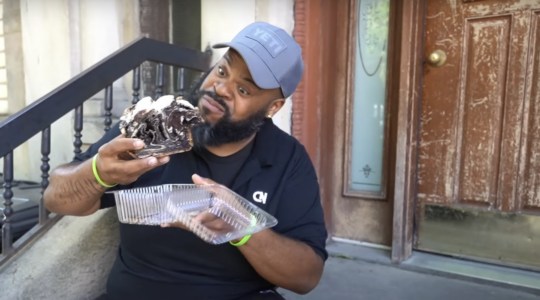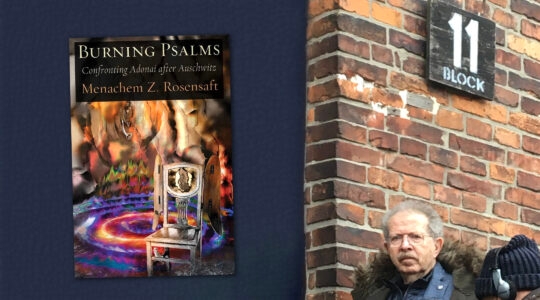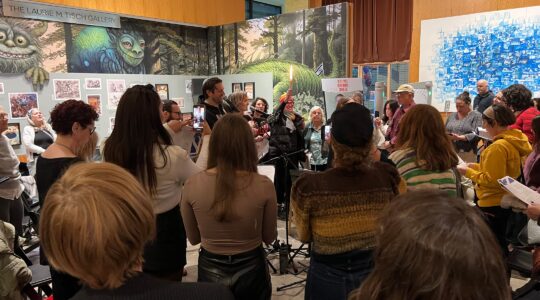We’ve traveled a long way from the old country, where Jewish life was absorbed by people growing up in their parents’ homes, traditions passed down from one generation to the next naturally, transmitted almost by osmosis in the shtetl square.
Fast forward to modern America, circa 2000, and the reality is that many of us were raised by parents who emphasized the American part of being American Jews and let the Jewish piece fall by the wayside.
Thing is, many of us have our own children now and we’re coming up against their questions and the challenges they face in being Jewish in America today. And as much as we may want them to have a positive sense of their own religious and ethnic identity, we don’t always have the answers we wish we did.
What is the correct Jewish response to Pokemon, after all?
Add to this the fact that becoming parents — from being involved in our children’s births on forward — awakens and deepens some of the spiritual longings that may have been slumbering inside our own souls.
A passel of books has been recently published to speak to this search for a vocabulary, this quest for answers, and this need to figure out how to help our kids relate to Judaism in overwhelmingly secular/Christian America when we know they’re not getting all of the answers in three hours a week of Hebrew school.
“People want to give their kids more than they themselves got,” said Rabbi Daniel Gordis, author of the book “Becoming Jewish a Jewish Parent: How to Explore Spirituality and Tradition With Your Children,” which was published last year by Crown Publishers.
His book, like a forthcoming volume by Anita Diamant and Karen Kushner, titled “How to be a Jewish Parent: A Practical Handbook for Family Life,” are straightforward guides to how to “do” Jewish. The Diamant-Kushner book will be published by Schocken Books in September.
They join several other, earlier books published in the last few years. One, an earlier how-to-do-Jewish guide titled “Jewish Family & Life: Traditions, Holidays and Values for Today’s Parents and Children,” was put together by Yossi Abramowitz and his wife, Rabbi Susan Silverman, in 1997.
Another more contemplative volume written by Rabbi Nancy Fuchs-Kreimer’s, “Parenting as a Spiritual Journey: Deepening Ordinary & Extraordinary Events Into Sacred Occasions,” has a lot of Jewish content, but is geared toward a wider audience. It was published by Jewish Lights in 1996.
This spurt of publications — as well as the innumerable adult education courses offered by every imaginable Jewish institution, alongside the proliferation of Web sites and e-mail lists which offer similar kinds of fare — reflects the new interest in conscious Jewish parenting.
“This search for roots and meaning is an American phenomenon, a baby-boomer phenomenon,” Diamant told The Jewish Week. “These days there’s a renewed sense of pride in being Jewish, and people know that you’re either an engaged Jew or a vague Jew.”
“Most of us had next to nothing, or a Jewish education that ended at bar or bat mitzvah. If you stopped your secular studies at 13, you would never read Shakespeare and then what kind of educated adult would you be?
“Parents, when they send their children to even moderately better supplementary schools, are acutely aware of what they don’t know,” said Diament.
Parents see, “as they start to raise their children, that the society around us is more and more aware of the need for spirituality,” according to Fuchs-Kreimer.
“As part of that intellectual middle-class world, we Jews are in the spiritual supermarket where you can do yoga and Tai Chi, and every day there’s a new product available to you. People see that this is pretty thin soup, that it doesn’t give the same kind of sustenance that Judaism does.
“In Judaism, people have the option of an old-age tradition that really has some gravitas to it, some past. It’s really yours, and it’s rooted not only in some nice ideas about spiritual practice, but also rooted in community, and community is what people are seeking.”
Gordis had the idea for his book when people who had read his first two books on spirituality, written for adults, said that they appreciated his ideas and wanted to communicate them to their children, but didn’t know where to begin.
“People are embarking on their own journeys along with their kids and aren’t just sending them to Hebrew school,” said Gordis in an interview from his home in Jerusalem, where he works as director of the Jerusalem Fellows program.
His book is being used by several havurot and Jewish book clubs as a basis for discussion, he said, though it is also designed to be a reference — as are the other books — to pull off the shelf when preparing for important Jewish events.
“There’s a new-found enthusiasm for integration in people’s lives, said Yosef Abramowitz, publisher of the group of Web sites anchored by Jewishfamily.com. “People used to be Jewish when they did Jewish things, and then American for the majority of their day and night. Today I find 3far more willingness to experiment with integrating the holy and not-yet holy, the secular and the Jewish.”
That’s visible in the fact that the fourth-busiest time on Jewishfamily.com (after the High Holy Days, Passover and Chanukah) is around Halloween, when parents are looking for a way to add a Jewish element to their children’s’ celebration of this decidedly secular, even heathen, holiday.
“Instead of making it either/or, and prohibiting any celebration of it, we’ve seen Purim costumes pop up during Halloween, and seen parents use it to have their children collect tzedakah, to emphasize Jewish values,” Abramowitz said.
Abramowitz and his wife started doing something that they got from Jewishfamily.com: they let their three children keep 10 pieces of the candy they collected trick-or-treating each Halloween. They “sell” the rest to their parents for a nickel per piece, which they then give to tzedakah.
Each of the recently published books about Jewish parenting addresses the “big,” obviously Jewish moments in life: the holidays, birth, bar and bat mitzvah, death, etc. But they also talk about the “small” moments which can be sanctified by what parents do with their children, like at bedtime, when parents share a quiet few minutes with their child, and while in the car, when Jewish music can be put on the tape or CD player.
Gordis discusses other heretofore “secular” transitions, like when a child goes to college or gets their own apartment for the first time.
“It makes a big statement whether you decide to get them National Geographic or a Jewish publication, a crystal bowl or a Chanukah menorah,” he said.
The biggest challenge to American Jewish parents today may be talking with their children about God. It can be such a scary topic freighted with all sorts of theological and psychological issues, that parents don’t address it at all.
“Lot of adults have misgivings about God, which are completely legitimate and reasonable questions to have,” Gordis said. But “when people have those responses and don’t talk to their kids about God they actually rob their kids, who are very interested in the wonders of the world and have a spiritual openness.
“We have different answers for a 5-year-old and a 12-year-old when they each ask about sex. But when it comes to God we destroy for them any possibility of a world of faith or belief or mystery when we pour all our doubts on the table.
“Kids have an innate, naive but almost holy spirituality that it’s important for parents not to steal from them,” he said.
Above all, this spurt of interest in learning how to be better Jewish parents — emphasis on Jewish — to our children is about unearthing what had been lost to many of us in the assimilationist era.
Today people are “reclaiming Jewish homes as sacred Jewish space,” said Abramowitz. “People used to do their Judaism in the synagogue or Jewish Community Center. From making challah to trying new rituals, today they’re doing it at home.
“It’s a sign of vitality.”
The New York Jewish Week brings you the stories behind the headlines, keeping you connected to Jewish life in New York. Help sustain the reporting you trust by donating today.




